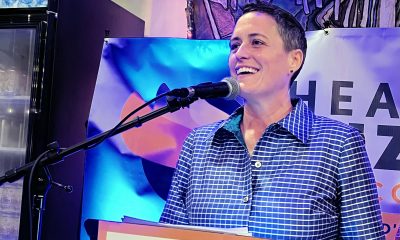Living
Queery: Heather Mizeur
20 gay questions with the Maryland state delegate

Heather Mizeur appears poised for re-election to the Maryland House of Delegates representing the 20th District (Montgomery County) after Tuesday’s primary.
Mizeur, who ran on a platform of broader health care availability, renewable energy production and equal rights for gays, says being openly lesbian has been a political advantage.
“The district overall is overwhelmingly progressive, one of the most progressive in the state,” she says. “That doesn’t mean there aren’t pockets of conservatives, but by and large, it’s really been an asset more than anything else. When I was running in 2006 there were seven of us running for three seats. Two were incumbents, five were challengers. When I was knocking on doors, I heard some people say, ‘You’re all the same on so many of the issues, I’m having a hard time distinguishing.’ Being able to say, ‘Well, I’m a lesbian,’ helped me stand out.”
Mizeur, a 37-year-old Takoma Park resident, grew up in Blue Mound, Ill., and came to Washington in 1994 where she worked in the offices of several Democratic members of Congress. She was Sen. John Kerry’s director of domestic policy from 2003 to 2006. A former Takoma Park City Council member, Mizeur has been in the General Assembly since 2007.
She gained national exposure when she was named a pivotal superdelegate at the 2008 Democratic National Convention in Denver, an episode she remembers with mixed feelings.
“I actually could have done without a lot of the elements of that process,” she says. “I felt there was too much emphasis on the candidates trying to court and recruit from the delegate count rather than running the primary system. … I didn’t think it was my place to pick a side or step in until all the voters had their say.” (She eventually endorsed Obama.)
Mizeur enjoys golf, wine, food, travel and quality time with family and friends in her down time. She and her spouse, Deborah Mizeur, were married in 2005 on the Chesapeake Bay and had a legal ceremony in Napa Valley, Calif., in 2008. They share their home with their dog, Chester.
How long have you been out and who was the hardest person to tell?
I came out in college, in 1993. I was most scared to tell my parents because I feared it would be the first time in my life I was going to disappoint them. We are a very close family and I was always the over-achiever, rule-following child that wanted my parents to be proud of me. I was terrified that this was going to be a wedge in our family. Thankfully, our family bond was stronger than that and after an initial bumpy few weeks, we returned to our regular interactions and my parents could not be more supportive.
Who’s your gay hero?
I don’t often think of people with labels attached, but if pressed, I would have to say Rachel Maddow. She’s done so much to promote issues of importance to our community with a savvy intelligence that resonates with audiences writ large.
What’s Washington’s best nightspot, past or present?
Ha. Well, the question presumes that I have an active nightlife. My preference is to drink really good wine with friends in the comfort of our home. When I choose to go out, though, I like MOVA quite a bit.
Describe your dream gay wedding.
We had our dream gay wedding in 2005, on the western shore of the Chesapeake Bay. Because Maryland hadn’t (and still hasn’t) stepped up to the plate on marriage equality, we borrowed from a Quaker tradition and had everyone in attendance sign an artist’s rendering of our wedding vows. This beautiful marriage license is framed and hanging in our living room. Some day soon we’ll make Maryland respect that and start granting licenses here in the Free State.
What non-gay issue are you most passionate about?
I’ve spent my entire professional career fighting to make sure that everyone in this country has access to affordable, high-quality health care. I’m most proud of laws I sponsored to cover an additional 170,000 Marylanders with health coverage. I’m eager to help Maryland implement federal health reform options in the most meaningful, innovative way possible.
What historical outcome would you change?
The assassinations of JFK, RFK and MLK
What’s been the most memorable pop culture moment of your lifetime?
As a kid, it would have to be Michael Jackson’s “Thriller” video release and craziness over his album. As an adult, I would say Melissa Etheridge playing the Grammys post-chemo and nailing her parts of the Janis Joplin song with Joss Stone. What an inspiration on how to find your strength to overcome adversity. It still gives me goose bumps.
On what do you insist?
That the toilet paper roll from the top of the roll.
What was your last Facebook post or Tweet?
Musings about missing a mentor who died of breast cancer in 1998. Penny was a state legislator in Illinois. Her niece recently contacted me to tell me she has been following my work in Maryland and that her aunt would have been proud. Caught me off guard. Made me cry. Felt like sharing the story with my friends – especially the ones from Illinois that also knew and admired her.
If your life were a book, what would the title be?
“Just a Small Town Girl”
If science discovered a way to change sexual orientation, what would you do?
Wake up, check my email, walk the dog, read the newspaper, eat breakfast, work, have lunch, go to a meeting, work, walk the dog, eat dinner, work, watch Rachel Maddow, kiss my wife goodnight, sleep. Repeat.
What do you believe in beyond the physical world?
By and large, traditional Catholic teachings. But in James’ Epistle, he says, “Faith without works is dead.” I believe we have to work in the here and now to create our heaven, our peace, our community and our relationship with our Creator.
What’s your advice for LGBT movement leaders?
Our community is as diverse as America and it will take all of us to win. So everyone take a deep breath, remember what we’re fighting for and work together.
What would you walk across hot coals for?
My wife.
What gay stereotype annoys you most?
How can you choose? They’re all so reductive.
What’s your favorite gay movie?
“Boys Don’t Cry” and “The Incredibly True Adventures of Two Girls In Love.”
What’s the most overrated social custom?
Registering for wedding gifts when you’re both already two adults that own everything.
What trophy or prize do you most covet?
Being selected a national Truman Scholar in 1994.
What do you wish you’d known at 18?
I was aware at an early age that the world is much bigger than any of us, and that learning never stops. But if I had the chance to tell my 18-year-old self anything, it would be a message similar to what many gay teens need to hear – that we’re all going to be OK. Specifically, it would have been nice to know that I will, indeed, marry an amazing woman and my parents will support me and so will my community; and that – gasp – I can even still have a viable chance at serving in elected public office as an openly lesbian candidate.
Why Washington?
It’s where political addicts live. It’s where you meet other people that want to make our country and world a better place.
Autos
Going for gold: Ford Bronco Sport vs. Toyota RAV4
SUV world has share of bright lights, bold entrances, cut-throat competitors

Let the games begin! Just like the Winter Olympics this month, the SUV world has its share of bright lights, bold entrances, and cut-throat competitors.
Enter the Ford Bronco Sport and Toyota RAV4, both ready to claim the podium but each with a different routine. Think hiking boots versus minimalist trainers. Dirt trails versus perfectly paved roadways.
FORD BRONCO SPORT
$34,000
MPG: 25 city/30 highway
0 to 60 mph: 8.2 seconds
Cargo space: 32.5 cu. ft.
PROS: Boxy chic. Off-road ready. Easy-clean interior.
CONS: Meh gas mileage. Firm ride. Outside noise.
The Bronco Sport doesn’t try to blend in — and that’s the point. With an upright stance, squared lines and retro-rugged styling, this compact SUV looks ready for a backcountry photoshoot before you’ve even left the driveway.
Power comes from a three-cylinder turbo engine that handles daily driving with ease. Opt for the four-cylinder turbo, and the personality shifts from relaxed to assertive. Passing power improves. Highway merges are confident rather than cautious.
The standard 4×4 system sets the tone immediately. Traction is constant. Confidence is built in. Add the G.O.A.T. drive trains (in Ford cute-speak, this means “Goes Over Any Terrain”), and the Bronco Sport adapts to mud, sand, snow and rocks like a decathlete moving between events. Higher trims add skid plates, upgraded suspension and special hardware that makes rough territory feel less intimidating.
On pavement, the Bronco Sport is stable and composed, though the firm suspension can be ass-busting over deep potholes and such. And wind noise at highway speeds is kinda annoying, a tradeoff for the boxy profile.
Inside, durability meets thoughtful design. Rubberized surfaces and easy-clean materials welcome muddy boots, sandy paws or ambitious weekend projects. The cargo area features a flip-up rear window and adjustable floor, making it a breeze to load gear. Storage cubbies and nylon straps keep equipment organized without fuss.
Safety and other tech amenities are modern and practical. Wireless smartphone integration, cameras and driver-assistance gizmos such as adaptive cruise control make daily driving and long trips easier to manage.
What truly sets this SUV apart? In a sea of aerodynamic lemmings, the Bronco Sport feels like a free spirit. Rugged. Confident. A little rebellious.
And, like alpine skier Breezy Johnson, it looks particularly good with a bit of trail dust.
TOYOTA RAV4

$34,000
MPG: 47 city/40 highway
0 to 60 mph: 7.1 seconds
Cargo space: 37.8 cu. ft.
PROS: Fuel savvy. Spacious. Tech-laden features.
CONS: Less-sporty ride. Blasé base trim. Pricey options.
If the Bronco Sport is the adventurous wanderer, the Toyota RAV4 is the precision athlete who arrives early, stretches properly and performs effortlessly. Cue figure skaters Amber Glenn or Paul Poirier and you get the picture.
Fully redesigned for 2026, this compact SUV retains a formula that has made it one of the best-selling vehicles in America, blending efficiency, versatility and lots of tech features.
Toyota nixed the traditional gas engine for the RAV4, but that’s just fine. All models are now either standard hybrids, with fuel economy in the mid-40 mpg range, or plug-in hybrids, which can go up to 50 miles on battery power alone. The result: Vehicles that can handle daily commutes in near silence while retaining long-distance flexibility that would make an Olympic coach proud.
Acceleration is smooth and responsive, particularly in the plug-in hybrid, which is surprisingly quick. The transition between electric and gas power is seamless, though heavy throttle inputs mean the engine sometimes sounds strained. Handling is more predictable than sporty, so this was a minor deduction on the RAV4’s scorecard … at least from me.
But overall comfort is outstanding. The suspension absorbs potholes and uneven pavement with ease, and cabin noise remains impressively low at highway speeds. Long road trips feel relaxed rather than fatiguing — less triathlon grind, more victory lap.
Toyota’s Safety Sense offers adaptive cruise control, lane-keeping assist, enhanced collision avoidance and other systems that operate smoothly without seeming intrusive.
Inside, the revamped cabin is user-friendly. Materials are more refined than before, especially in mid- and upper-level trims. A large, high-resolution touchscreen supports the latest apps, voice commands and over-the-air updates. Such a layout is intuitive instead of flashy — stylish athleisure rather than couture.
Passenger space is generous, and cargo capacity remains among the most practical in this segment. The wide opening is especially helpful when tossing in luggage, sports equipment or an overly optimistic warehouse haul.
For drivers like me who are quick to judge efficiency, reliability and daily usability, the RAV4 delivered a gold-medal performance.

Valentine’s Day is often portrayed as a celebration of romantic love — flowers, chocolates, and candlelit dinners. But for many LGBTQ+ individuals and couples, Valentine’s Day can also be a moment to reflect on something deeper: the love that creates a safe, welcoming home.
For LGBTQ+ home buyers and sellers, homeownership is more than a financial milestone—it is an act of belonging, resilience, and pride. Owning a home can mean finally having a place where you can hold hands with your partner on the front porch, decorate with your authentic style, and build a life free from judgment. In this way, buying or selling a home is one of the most meaningful love stories many LGBTQ+ people will ever write.
This Valentine’s Day, whether you’re a first-time gay home buyer, a same-sex couple upgrading your space, or an LGBTQ+ seller moving on to your next chapter, it’s worth thinking about how love, identity, and real estate intersect—and how to navigate that journey with confidence, protection, and the right support.
Love, Identity, and the Meaning of ‘Home’
For generations, LGBTQ+ people were denied equal access to housing, homeownership, and legal protections. Even today, many LGBTQ+ home buyers still face subtle bias, uncomfortable interactions, or outright discrimination in the real estate process.
That’s why finding LGBTQ+ friendly real estate and an affirming gay friendly realtor or lesbian realtor matters so much. A home isn’t just a building—it’s a personal sanctuary. Working with LGBTQ+ real estate agents who understand your lived experience can make all the difference between a stressful transaction and a joyful one.
For over 30 years, GayRealEstate.com has been the leading gay real estate network, connecting LGBTQ+ home buyers and sellers with gay real estate agents, lesbian real estate agents, and LGBTQ+ friendly realtors who truly “get it.” Their mission has always been simple yet powerful: to ensure that every LGBTQ+ person has access to safe, respectful, and inclusive real estate services.
Finding Your Match: Choosing the Right LGBTQ+ Friendly Realtor
Much like dating, finding the right real estate agent is about compatibility, trust, and communication. Here are some key tips for choosing the best LGBTQ+ real estate representation:
- Look for experience with LGBTQ+ clients. Search for a gay realtor near me or lesbian realtor near me through GayRealEstate.com, where agents are vetted for cultural competency and community commitment.
- Ask about their experience with same-sex couple home buying. A strong agent should understand issues like joint ownership, legal protections, and financing considerations.
- Choose someone who listens. You should feel safe sharing your priorities—whether that includes proximity to LGBTQ+ nightlife, affirming schools, or lesbian-friendly neighborhoods.
- Prioritize respect and transparency. Your agent should advocate for you, not just push a quick sale.
The right gay friendly real estate agent isn’t just helping you buy a house—they’re helping you find a place to build your life.
Best Cities for LGBTQ+ Home Buyers
If love is your compass, location is your map. Some of the best cities for LGBTQ+ home buyers consistently offer strong community presence, legal protections, and welcoming neighborhoods:
- Wilton Manors, Florida – A hub for LGBTQ+ culture with thriving LGBTQ+ real estate opportunities
- Palm Springs, California – A long-standing LGBTQ+ retirement and second-home destination
- Provincetown, Massachusetts – Historic LGBTQ+ community with progressive housing protections
- Asheville, North Carolina – Growing market with inclusive real estate services
- Fort Lauderdale, Florida – Diverse, welcoming, and highly sought-after for LGBTQ+ home ownership
Working with GayRealEstate.com allows you to connect with local LGBTQ+ real estate experts who know these markets inside and out.
Navigating Legal Protections in LGBTQ+ Real Estate
Love is universal—but legal protections are not always consistent. Understanding your rights is essential when buying or selling a home as an LGBTQ+ person.
Key protections include:
- Fair Housing Act (FHA): Prohibits discrimination based on sex, which courts have increasingly interpreted to include sexual orientation and gender identity.
- State and local protections: Many cities and states offer additional safeguards against LGBTQ+ housing discrimination.
- Same-sex couple legal considerations: If you are married, joint ownership is typically straightforward. If not, consult an attorney about co-ownership agreements.
A knowledgeable LGBTQ+ friendly realtor from GayRealEstate.com can help guide you through these complexities and connect you with trusted legal professionals when needed.
Buying a Home as an LGBTQ+ Person: Practical Tips
If you’re embarking on your home-buying journey this Valentine’s season, here are smart, practical steps to take:
- Clarify your priorities. Do you want a vibrant LGBTQ+ neighborhood, quiet suburbs, or access to queer community spaces?
- Get pre-approved for a mortgage. This strengthens your position in competitive markets.
- Work with an LGBTQ+ real estate agent. Searching “finding a gay real estate agent” or “finding a lesbian real estate agent” through GayRealEstate.com is a great first step.
- Research inclusive communities. Some neighborhoods are more welcoming than others.
- Know your rights. If you experience bias, document it and seek legal guidance.
Buying a home is an act of self-love—and community love.
Selling a Home as an LGBTQ+ Person
Selling can be just as emotional as buying, especially if your home represents years of memories with your partner, friends, or chosen family.
When selling a home as an LGBTQ+ person, consider:
- Working with a gay friendly realtor who will market your home inclusively
- Highlighting LGBTQ+ community appeal in listings
- Being prepared for potential buyer bias (and knowing how to respond)
- Leaning on GayRealEstate.com’s LGBTQ+ real estate services for trusted guidance
Your story—and your home—deserve respect.
Real Estate for LGBTQ+ Families
More LGBTQ+ couples are raising children, fostering, or building blended families. This makes homeownership even more meaningful.
When searching for real estate for LGBTQ+ families, consider:
- LGBTQ+ affirming school districts
- Family-friendly queer communities
- Safe neighborhoods with inclusive values
- Access to LGBTQ+ resources and social networks
GayRealEstate.com specializes in helping LGBTQ+ families find homes that truly fit their lives.
Love, Pride, and Homeownership
At its core, Valentine’s Day is about connection. For LGBTQ+ people, homeownership can be one of the most profound expressions of love—love for yourself, your partner, your family, and your future.
Whether you are a first-time gay home buyer, a same-sex couple relocating, or an LGBTQ+ seller moving forward, you deserve an experience rooted in dignity, fairness, and celebration.
For over three decades, GayRealEstate.com has stood as the leading source for LGBTQ+ real estate, gay real estate, lesbian real estate, and LGBTQ+ home buying and selling representation. Their nationwide network of gay real estate agents, lesbian-friendly real estate agents, and LGBTQ+ friendly realtors ensures that your real estate journey is guided by professionals who understand your heart—and your home.
This Valentine’s Day, let your next chapter be written in a place where you can truly belong. Because when love leads the way, home is never far behind.
Scott Helms is president and owner of Gayrealestate.com.

Dear Michael,
I keep getting rejected on the apps. I don’t want to put myself out there anymore.
I don’t understand gay men. I think they behave really badly.
Guys stop replying in the middle of a text conversation and then un-match me. Guys don’t show up when we make a plan to meet. After a date or even a hookup that it seems clear we both enjoyed, I never hear from the guy again.
I am a pretty good looking and successful guy. I’m not a model or a billionaire but I’m sincerely wanting to date and eventually share a life with someone.
Unfortunately, everyone I am meeting, even if they say they have similar aspirations for a partner, acts like they’re looking over my shoulder for something better, and drops me for I-don’t-know-what reason.
I don’t have a lot of trust in the sincerity of gay men.
I know I sound bitter but I’ve been at this for a while and it keeps happening.
I know there’s a saying that if it keeps happening to you, you must be the problem. Logically that makes sense.
Except, I think this keeps happening so often and so predictably that it’s not me. These people hardly know me. It’s more along the lines of, if everything about me isn’t exactly what they want, or some little thing that I say, think, or do offends them, they vanish.
I’m lonely, but what’s out there is awful. Maybe it’s best to not keep trying.
If you have a different way of seeing it that’s honest, not just some fluff to make me feel better and be hopeful, please enlighten me.
Michael replies:
I agree with you, there is a lot of this kind of behavior out there. I hear stories similar to yours all the time. Though people do find great relationships online, relying on apps to meet a partner can be tricky.
Hookup apps have little to do with any kind of real connection. Often, they don’t even have much to do with sex. For a lot of people, they’re more about trying to fill up some kind of emptiness and seeking validation. They also, obviously, objectify men, which is the opposite experience of what you’re seeking.
And dating apps lend themselves to a sort of takeout menu concept of dating. You get to specify exactly what you’re looking for—a little of this, a lot of that, please omit something else—and then believe you should get what you ordered. As if that really exists. And when something isn’t just what you wanted, forget it.
But life doesn’t work that way. Nor do people: You can enter the exact criteria for the man of your dreams, but he will surprise you or let you down at times in some major ways. That’s how it goes. Part of being in a relationship is accepting that we all have to deal with imperfection.
All that said, hordes of people are going to keep using all sorts of apps and keep looking for “perfect” partners and keep ditching perfectly fine guys for the most minuscule of reasons.
But that doesn’t mean that you have to stay on the apps if it’s demoralizing you and leaving you hopeless.
Before you sign off, perhaps you would like to have some fun and be creative. Just for example, you could write in your profile that you’re interested in meeting a guy who isn’t looking for perfection and is looking for a decent soul rather than a set of stats. You still might encounter a lot of guys who ghost you for no apparent reason, but you also might have some luck finding a sincere someone with relationship goals that are similar to yours.
Another, complimentary strategy: Toughen up your attitude to stop letting let these rejections get under your skin. They have little to do with who you are (unless you are oblivious to some major issue about yourself), so you needn’t take them personally. In other words, expect this to keep happening; and when it does, laugh and keep moving forward.
I understand you are feeling like giving up on gay men in general. Keep in mind that while there are a lot of reasons why many gay men focus more on sex and less on commitment, that isn’t true across the board. In my work over the years, I have met many gay men who are looking for what you’re seeking. You could strive to be hopeful that if you keep looking, you are likely to cross paths with some of them.
And where you look may play a role.
Whether or not you stay on the apps, I suggest you seek additional ways to meet a potential boyfriend. Before apps existed, people did find other ways to meet romantic partners, and these ways do still exist. I know that this path is not an easy one. The whole dating endeavor isn’t easy. But difficult is not impossible.
There are social and activity groups for gay men that are organized around some sort of shared interest. They aren’t overtly sexual, so often attract people who are interested in and looking for a deeper connection. Even if you don’t meet a boyfriend there, you might make some like-minded friends, and one thing may lead to another in all sorts of ways.
There’s also plenty you can do as a human being (not simply as a gay man) in the offline world that might interest and even uplift you, where you just might meet a man you like. Again, you might also simply make some friends, and through having a bigger social life, might ultimately meet your guy.
Simply put: Don’t let yourself feel like or be a victim. Don’t keep putting yourself in miserable situations. And figure out what it means for you to do your best to make what you’d like to happen, happen.
Michael Radkowsky, Psy.D. is a licensed psychologist who works with couples and individuals in D.C., Maryland, Virginia, and New York. He can be found at michaelradkowsky.com. All identifying information has been changed for reasons of confidentiality. Have a question? Send it to [email protected].





















